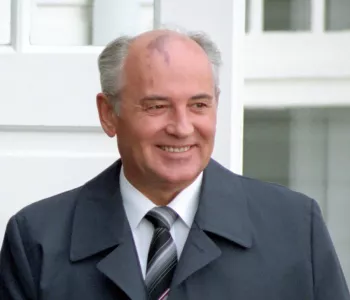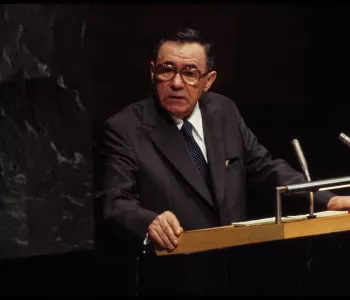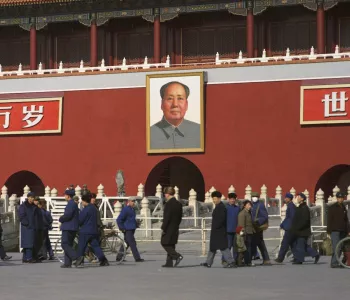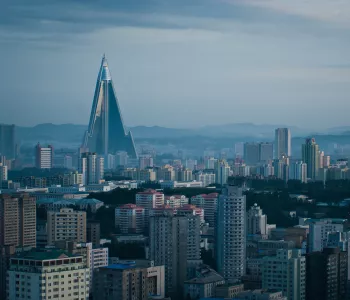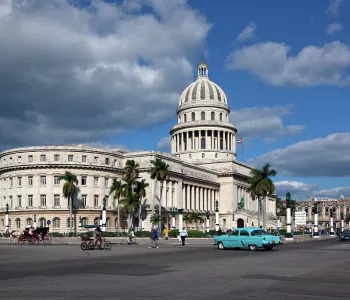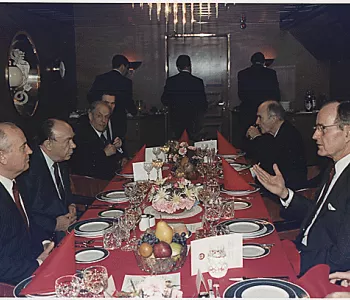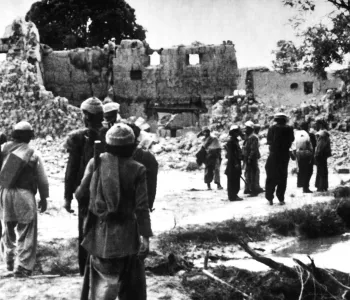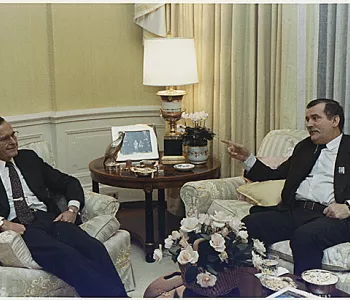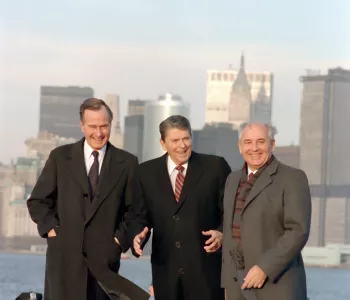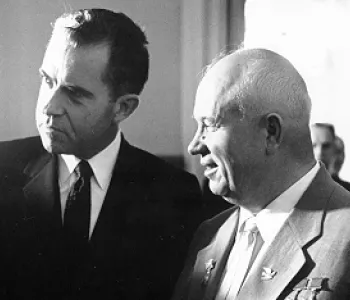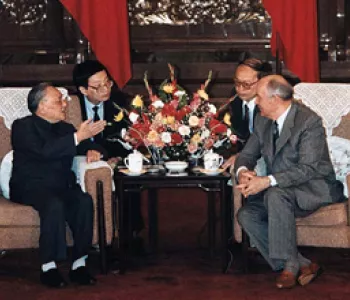d'Vinci

Shevardnadze, Eduard Amvrosievich 1928- 2014
Eduard Amvrosiyevich Shevardnadze wass a Georgian politician. He served under Mikhail Gorbachev as the Minister of Foreign Affairs of the Soviet Union from 1985 to 1990.
Minister of Foreign Affairs, USSR, 1985-1990; President, Georgia, 1995-2003

Eduard Amvrosiyevich Shevardnadze was a Georgian politician. He served under Mikhail Gorbachev as the Minister of Foreign Affairs of the Soviet Union from 1985 to 1990 and was the President of Georgia from 1995 until 23 November 2003. He resigned his position in the midst of mounting criticism following disputed parliamentary elections.
Shevardnadze joined the Communist Party of the Soviet Union in 1948 after two years as a Komsomol instructor and rose through the ranks to become a member of the Georgian Supreme Soviet in 1959. He was appointed Georgian Minister for the maintenance of public order in 1965 and subsequently became Georgian Minister for Internal Affairs from 1968 to 1972 with the rank of general in the police. He gained a reputation as a fierce opponent of corruption, which was endemic in the republic, dismissing and imprisoning hundreds of officials. One of his first reported acts was to call for a show of hands by senior officials and promptly ordering all those displaying expensive black-market watches to take them off and hand them in. However, he never succeeded in entirely stamping out corruption. As late as 1980, he found it necessary to reiterate that economic and social development depended on "an uncompromising struggle against such negative phenomena as money-grubbing, bribe-taking, misappropriation of socialist property, private-property tendencies, theft and other deviations from the norms of communist morality."
A corruption scandal in 1972 forced the resignation of Vasily Mzhavanadze, the First Secretary of the Georgian Communist Party. His downfall may have been precipitated by Shevardnadze, who was the natural replacement candidate and was duly appointed to the post. During his time as First Secretary, he continued to attack corruption and dealt firmly with dissidents. In 1977, as part of a Soviet Union-wide sweep against human rights activists, his government imprisoned a number of prominent Georgian dissidents on the grounds of anti-Soviet activities. These including the leading dissidents Merab Kostava and Zviad Gamsakhurdia, who later became the first democratically elected President of the Republic of Georgia.
Shevardnadze's hard line on corruption soon caught the attention of the Soviet hierarchy. He joined the Central Committee of the Soviet Communist Party in 1976 and in 1978 was promoted to the rank of candidate (non-voting) member of the Soviet Politburo. He remained fairly obscure for a number of years, although he consolidated a reputation for personal austerity, shunning the trappings of high office and travelling to work by public transport rather than using the limousines provided to Politburo members. His chance came in 1985 when the veteran Soviet Minister of Foreign Affairs, Andrei Gromyko, resigned. Soviet General Secretary Mikhail Gorbachev appointed Shevardnadze to the post, thus consolidating Gorbachev's circle of relatively young reformers.
He subsequently played a key role in the détente which marked the end of the cold war. He was credited with helping to devise the so-called "Sinatra Doctrine" of allowing the Soviet Union's eastern European satellites to "do it their way" rather than forcibly restraining any attempts to pursue a different course. When democratization and revolution began to sweep across eastern Europe, he rejected the pleas of eastern European communist leaders for Soviet intervention and smoothed the path for a (mostly) peaceful democratic transformation in the region. He reportedly told hardliners that "it is time to realize that neither socialism, nor friendship, nor good-neighborliness, nor respect can be produced by bayonets, tanks or blood." However, his moderation was seen by some communists and Russian nationalists as a betrayal and earned him the long-term antagonism of powerful figures in Moscow.
During the late 1980s, as the Soviet Union descended into crisis, Gorbachev and Shevardnadze became increasingly estranged from each other over policy differences. Gorbachev fought to preserve a socialist government and the unity of the USSR, while Shevardnadze advocated further political and economic liberalization. He resigned in protest against Gorbachev's policies in December 1990, delivering a dramatic warning to the Soviet parliament that "Reformers have gone and hidden in the bushes. Dictatorship is coming." A few months later, his fears were partially realized when an unsuccessful coup by communist hardliners precipitated the collapse of the Soviet Union. Shevardnadze returned briefly as Soviet Foreign Minister in November 1991 but resigned with Gorbachev the following month when the Soviet Union was formally dissolved.
Eduard Shevardnadze's political career was filled with contradictions. He was a product of the Soviet system, but played a central role in dismantling that system. He built his reputation on fighting political corruption, but came to be seen as using corrupt methods to shore up his own position. He achieved worldwide renown as possibly the most liberal foreign minister in the history of the Soviet Union, but was never nearly as popular in his own country. He succeeded in maintaining Georgia's territorial integrity in the face of strong separatist pressures, but was unable to restore his government's authority in large areas of the country. He helped to establish a viable civil society in Georgia, but resorted to rigging elections to maintain his powerbase.
When Shevardnadze joined the Georgian state council in 1992 in the chaotic aftermath of the coup against Zviad Gamsakhurdia, he presented himself as being the best candidate to guide Georgia through its difficult rebirth as an independent nation. Over time, he seemed to have become convinced that his interests and Georgia's were essentially the same, justifying the use of unscrupulous tactics in the apparent belief that Georgia could not survive without him. His downfall ushered in a renewed period of uncertainty in Georgian politics. One positive aspect in the eyes of many observers was the fact that, under his rule, a vigorous civil society had become well established and would possibly be better able to meet the challenge than had been the case in the early 1990s.
